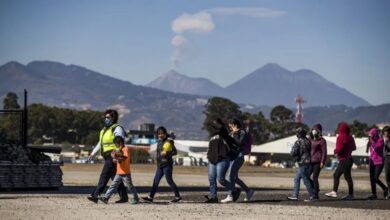Panama Prepares Deportation Flights for Migrants Crossing the Darien Jungle

Panama plans to start deportation flights for migrants who traverse the dangerous Darien jungle within the next few months. This initiative, funded by the United States, aims to manage the significant flow of migrants and strengthen border controls.
With the Darien jungle serving as a perilous gateway, Panama is swiftly gearing up to initiate deportation flights for migrants. Roger Mojica, the country’s chief of migration, has announced that operations are expected to commence within the next two to three months. This initiative, part of a recent agreement with the United States, is a testament to the urgency with which Panama is addressing the significant flow of migrants.
“We are establishing the needs, equipment, and requirements that Panama has to face to start the program, and we are in conversations with the United States,” Mojica said during a conference call. “We estimate we should be able to start the process in two to three months.”
Panama’s newly elected president, Jose Raul Mulino, has made a solid commitment to curbing illegal immigration, working closely with the U.S. to regulate the flow of migrants through the Darien Gap. This dense and hazardous jungle is a natural bridge between Central and South America. It has become a critical passage for migrants seeking better opportunities and security in the North.
Last year, half a million migrants crossed the Darien Gap, underscoring the urgent need for effective migration management. Panamanian authorities estimate that around 213,702 migrants have crossed the Darien so far this year, with many of them being children. This migration surge highlights Panama’s growing humanitarian and logistical challenges, emphasizing the pressing need for action.
With its treacherous terrain and dense forest, the Darien Gap presents significant risks to migrants. Many face dangers from natural elements and potential threats from criminal groups operating in the area. The Panamanian government’s initiative to implement deportation flights is part of a broader strategy to address these risks and manage the influx of migrants more effectively, highlighting the human cost of the migration crisis.
Collaborating with the United States
The recent agreement between Panama and the United States is a significant milestone in the bilateral cooperation on migration issues. The U.S. funding for deportation flights is a clear demonstration of the shared commitment to controlling unlawful immigration and ensuring that migrants are processed and managed humanely. This collaborative approach is crucial in addressing the migration crisis and providing a structured response to our challenges.
“We are in close collaboration with the United States to ensure that the deportation program is effective and humane,” Mojica stated. “This partnership is crucial in addressing the migration crisis and providing a structured response to our challenges.”
The United States has also been actively involved in providing logistical support and resources to help Panama manage the influx of migrants. This includes assistance in setting up necessary infrastructure and providing training for Panamanian officials involved in the deportation process. The collaboration aims to create a sustainable and effective system to handle ongoing migration pressures.
Regional Implications and Political Context
Migration through the Darien Gap is not just a Panamanian issue; it has significant implications for the entire region. Central and South American countries are grappling with the effects of mass migration, which is driven by factors such as political instability, economic hardship, and violence in their countries of origin.
The migration crisis has also become a critical issue in the upcoming elections in the United States. As a key destination for many migrants, U.S. policies and political stances on immigration directly impact migration patterns. Republican candidate and former President Donald Trump has pledged to implement more robust border controls and mass deportations, reflecting a hardline stance on immigration that resonates with a significant portion of the electorate.
Panama’s approach to managing migration, in cooperation with the United States, underscores the interconnected nature of migration policies and the need for regional collaboration. While the deportation flights are a significant step towards addressing the immediate challenges posed by the migration crisis, they also serve as a stark reminder of the need for comprehensive solutions. These solutions must not only manage the current influx of migrants but also address the root causes of migration, such as economic hardship and political instability.
Humanitarian Concerns and Future Prospects
While the deportation flights are a logistical and policy response to the migration crisis, they also raise critical humanitarian concerns. Ensuring that migrants are treated humanely and their rights are respected is a priority for Panama and the United States.
“The humanitarian aspect of migration management cannot be overlooked,” Mojica emphasized. “We are committed to ensuring that the deportation process is carried out with respect for human rights and dignity.”
Human rights organizations and advocacy groups have called for greater transparency and accountability in the deportation process. They stress the importance of providing migrants with access to legal assistance and ensuring that vulnerable individuals, such as children and those with medical needs, receive appropriate care and support.
The future of migration management in Panama will likely involve a combination of immediate measures, such as deportation flights, and long-term strategies to address the underlying causes of migration. Economic development, political stability, and improved security in migrants’ countries of origin are essential components of a sustainable solution.
A Critical Juncture for Migration Management
Panama’s preparations to start deportation flights for migrants crossing the Darien jungle reflect a critical juncture in the country’s approach to managing migration. The collaboration with the United States and the focus on enhancing border controls are steps toward addressing the immediate challenges posed by the migration crisis.
Also read: Panama Border Closures May Increase Endemic Diseases in Colombia
However, the issue’s complexity requires a multifaceted approach that balances logistical, political, and humanitarian considerations. As Panama moves forward with its plans, the importance of regional cooperation and comprehensive solutions becomes ever more evident. By addressing the root causes of migration and ensuring that migrants are treated humanely, Panama can contribute to a more stable and secure future for the region.




